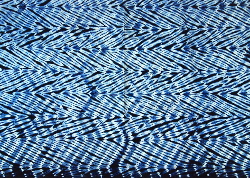Choice of threads for tie dye
 It is important to choose the best possible thread. The thread must be strong enough not to break half way through tying. It is important to choose the best possible thread. The thread must be strong enough not to break half way through tying.
Suitable threads:
- Natural raffia is excellent for tying and easy to untie, making raffia a good choice for tie dye. You can either make bold marks with thicker pieces of raffia or easily split it into thinner pieces for finer marks. Being a natural fibre, raffia is an appropriate material to use with natural fabrics and natural dyes. Another advantage of raffia is that it is not as hard on hands as sewing thread. Tip: choose natural colour raffia and give it a good rinse before using it.
- Crochet cotton Perle #5 is very good for ties, but it is a bit too thick for stitched resists.
- Artificial sinew has a waxy coating, it can be tied very tightly and it provides a good resist, however it tends to fray at the ends so it is not so suitable for stitched resists.
- Top stitch thread (polyester rather than cotton) or buttonhole twist, which is also sold as ‘extra strong’ (sometimes marked nr 30 on the spool) is good for stitched resists. It works well for ties too, but can be a bit hard on the hands.
- Some makes of polyester sewing thread (e.g. Gutterman) produce good results, but the sewing thread of other makes breaks easily. You could try using them doubled-up for stitched resists, but be aware that doubled-up thread can easily become tangled.
- Bonded nylon thread is especially strong and is good for ties, but it can be difficult to tie a tight knot. The thread is slippery and the knot can easily come undone, requiring double knotting nearly every time.
- Dental floss is a popular strong thread for tying; however some types produce a weak image with low contrast between the resist and the dyed area.
- Gummy reeled silk is very good to use on silk. The sericin present on the silk thread hold the knots together and helps prevent the dye penetrating the resists. Use this thread when you have mastered basic shibori and are ready to move on to more advanced techniques.
Less suitable threads:
- Rubber bands are easy to use but they can fall apart in a warm dye bath. The resulting shapes don’t look as interesting as ties made with thread.
- ‘Water soluble yarn’ tightens at 40°C and dissolves at 70°C so it is only suitable for dye pots with lower temperatures. This type of yarn is a more expensive alternative and it is supposed to save the time and bother of removing the ties. However, I found the 90 denier weight available on sale too weak for tying. It is also difficult to thread on a needle, as the plies of the yarn separate in opposite directions.
- Knitting wool is soft and therefore lets the dye penetrate under the tie resulting in faint patterns.
- Cotton sewing thread is not strong enough and tends to snap.
- Fine weaving cotton thread (2/12 or 2/20) is too weak.
- Fine silk thread (size 2/30) is not as strong as polyester or Perle cotton so it tends to snap when pulled tight. However, after dyeing, you end up with dyed embroidery thread as well as tie-dyed cloth.
Go to:
a) Fabric for tie dyeing (opens a new page)
b) Natural dyes for tie dyeing (opens a new page)
d) Tie dye tips (opens a new page)
Top of page
|